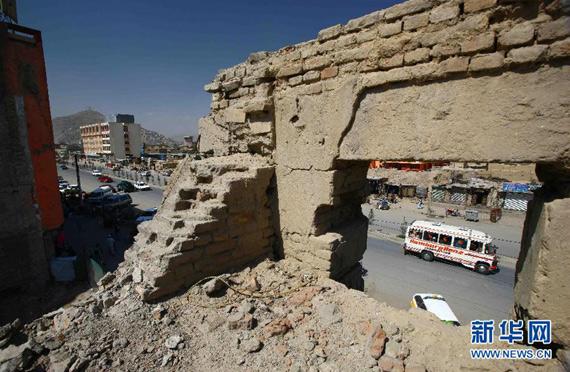Regional cooperation needed to stop IS in Afghanistan
- By Aftab Hussain
 0 Comment(s)
0 Comment(s) Print
Print E-mail China.org.cn, April 4, 2018
E-mail China.org.cn, April 4, 2018

Kabul, the capital of Afghanistan [Photo/Xinhua]
A Pakistan-Russia Joint Working Group meeting on terrorism was held in Islamabad this month. Both countries expressed concern over the growing threat of the Islamic State group in the region, especially in Afghanistan, and showed a commitment to continued cooperation toward defeating terrorism. The working group meeting signifies an improvement in Russia-Pakistan ties. Moscow on occasion has openly supported Islamabad’s counterterrorism policies and realizes the sacrifices that the people of Pakistan have made in their war against terrorism.
The regrouping of IS militants is a genuine threat to the peace and security of the whole region. The immediate risk is to the neighbors of Afghanistan, and requires a comprehensive solution involving important countries of the region. However, no solution to eliminate terrorism from Afghanistan will work without support from Kabul. The country’s border areas are porous and most parts are unmanned. IS militants can sneak into neighboring nations and carry out terrorist activities. A lot of resources are required to fence or man the long and porous Pakistan-Afghan border. On several occasions terrorists have crossed the border, carried out illegal activities inside Pakistan and fled to Afghanistan. Several terrorists sought by the Pakistani government are currently hiding in Afghanistan.
The problem of terrorism is so grave that the Afghan government cannot be blamed solely for not taking steps to counter it. The ill-trained and ill-equipped Afghan National Army cannot be expected to single-handedly wipe out terrorism from the country. There have been many suggestions and policy recommendations since 2001 to solve the Afghan conundrum. Such measures have helped the country improve its security situation while aiding in the rejuvenation of its economy and the strengthening of its institutions.
Nevertheless, such reforms have been implemented only in places where the writ of the Afghan government is imposed. There is still a large territory which is under the control of the Afghan Taliban, and nothing has changed there since the beginning of Taliban rule in the country. The peace process between the government and the Taliban is slow and will take more time to bear any fruit that prolongs national stability. Meanwhile, the threat of IS is growing and wreaking havoc inside and outside the country.
The militants in Afghanistan can be divided into five broad categories. There are: one, the Afghan Taliban; two, local warlords; three, transplants from neighboring countries such as Uighurs from China, Taliban members from Pakistan, and Hezb-i-Islami members from Uzbekistan; four, miscellaneous and not-so-organized militants; and fifth, the IS group. While IS is not as organized there as it is in the Middle East, one of the underlying reasons could be that the Afghan Taliban or other already-present militant organizations there do not want IS to be a shareholder. On the other hand, there is the potential for IS to develop into a giant organization. Factions with an extremist mentality already exist in all the bordering countries, and the current militants in Afghanistan share with IS a similar radical ideology. This could lead to the fusion of the prevailing militant organization with IS.
Thus, regional countries need to foster cooperation to counter the threat. Most important is that these countries agree to actively participate in combined counterterrorism activities. Secondly, they can create a counterterrorism fund which could be used to fence the Afghan border and areas of potential threat. The fund will be used to raise resources and enhance manpower to fight terrorism. Since it is a risk to everyone, it requires participation from everyone.
Presently, every country is engaged in counterterrorism on its own, thereby exhausting their resources. Pakistan had a bitter experience fighting against terrorism alone. It drained the country’s economy and, with little financial aid from the U.S., Pakistan’s economic development was almost derailed. It speaks to the resilience of the people of Pakistan that, despite their suffering and sacrifices, they were determined to chase away the terrorists. The security situation has improved immensely in the country, but now the threat is reemerging in the shape of IS in neighboring Afghanistan. A combined resource pool will decrease the burden for combatting terrorism, and will also provide a platform for countries to share and learn from each other’s counterterrorism experiences.
China, Russia, Iran, Pakistan, Central Asian states and Afghanistan should work together to establish this counterterrorism fund, as these countries share the most immediate risk. All affected nations need to understand the gravity of the situation and act immediately, before the threat of IS spreads further.
Aftab Hussain is a research scholar of International Relations based in Shanghai.
Opinion articles reflect the views of their authors, not necessarily those of China.org.cn.






Go to Forum >>0 Comment(s)